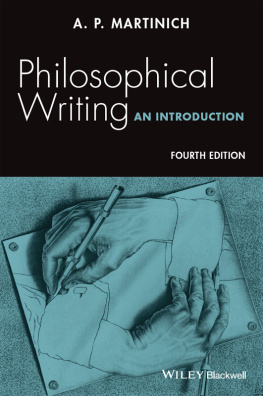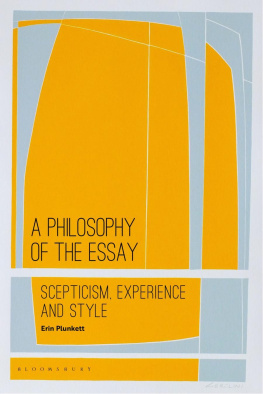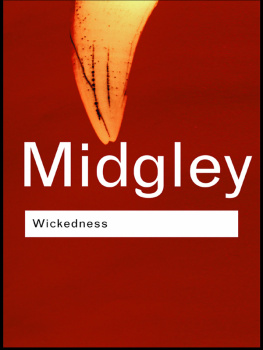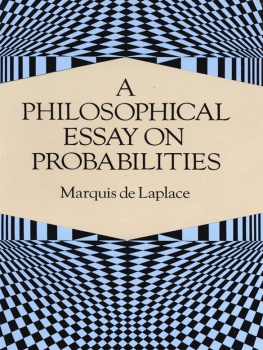
Philosophical Writing
An Introduction
Fourth Edition
A. P. Martinich
This edition fourth published 2016
2016 John Wiley & Sons, Inc.
Edition history: Prentice-Hall Inc. (1e, 1989); Blackwell Publishers Ltd (2e, 1996);
Blackwell Publishing Ltd (3e, 2005)
Registered Office
John Wiley & Sons Ltd, The Atrium, Southern Gate, Chichester, West Sussex, PO19 8SQ, UK
Editorial Offices
350 Main Street, Malden, MA 02148-5020, USA
9600 Garsington Road, Oxford, OX4 2DQ, UK
The Atrium, Southern Gate, Chichester, West Sussex, PO19 8SQ, UK
For details of our global editorial offices, for customer services, and for information about how to apply for permission to reuse the copyright material in this book please see our website at www.wiley.com/wiley-blackwell.
The right of A. P. Martinich to be identified as the author of this work has been asserted in accordance with the UK Copyright, Designs and Patents Act 1988.
All rights reserved. No part of this publication may be reproduced, stored in a retrieval system, or transmitted, in any form or by any means, electronic, mechanical, photocopying, recording or otherwise, except as permitted by the UK Copyright, Designs and Patents Act 1988, without the prior permission of the publisher.
Wiley also publishes its books in a variety of electronic formats. Some content that appears in print may not be available in electronic books.
Designations used by companies to distinguish their products are often claimed as trademarks. All brand names and product names used in this book are trade names, service marks, trademarks or registered trademarks of their respective owners. The publisher is not associated with any product or vendor mentioned in this book.
Limit of Liability/Disclaimer of Warranty: While the publisher and author have used their best efforts in preparing this book, they make no representations or warranties with respect to the accuracy or completeness of the contents of this book and specifically disclaim any implied warranties of merchantability or fitness for a particular purpose. It is sold on the understanding that the publisher is not engaged in rendering professional services and neither the publisher nor the author shall be liable for damages arising herefrom. If professional advice or other expert assistance is required, the services of a competent professional should be sought.
Library of Congress Cataloging-in-Publication Data
9781119010036 [paperback]
Martinich, Aloysius.
Philosophical writing : an introduction / A.P. Martinich. Fourth Edition.
pages cm
Includes bibliographical references and index.
ISBN 978-1-119-01003-6 (pbk.)
1. PhilosophyAuthorship. I. Title.
B52.7.M37 2015
808.06'61dc23
2015015491
A catalogue record for this book is available from the British Library.
Cover image: M.C. Escher, Drawing Hands, 1948. 2015 The M.C. Escher Company, The Netherlands. All rights reserved. www.mcescher.com
In memory of
my mother and father
Note to the Fourth Edition
This edition contains several new sections, such as one on how to read a philosophical essay, one on quantification and modality, and one on rhetoric in philosophical writing. It also includes new and more examples. Another feature of this edition is a website that complements the material in the book. The website contains four kinds of material: (1) some additional explanation of some topics treated in the book; (2) some additional examples of topics discussed in the book; (3) some additional exercises, which I think of as being primarily for the benefit of the student; (4) a few additional topics that were not essential to the purpose of the book but will still be helpful to many students. The website can be found at www.wiley.com/go/Martinich.
I want to thank Leslie Martinich, who helped enormously with editing, as always, Neil Sinhababu, who updated the appendix on using internet sources, and J. P. Andrew, who commented on the section on quantification. My editor at Wiley-Blackwell, Deirdre Ilkson, has been helpful and supportive on this and other projects; and Sarah Dancy and Allison Kostka have ably shepherded this edition through the publication process.
Note to the Third Edition
This edition contains a number of changes. In general, I have tried to improve the sample essays and other examples, correct errors of fact, and make the prose more straightforward. Some of the most important changes are several new appendices, such as the one about the use of the internet by Neil Sinhababu. I want to thank Jo Ann Carson and Charles Hornbeck for several suggestions and, as usual, I want to thank my wife Leslie for her versatile help.
Note to the Second Edition
Writing to a friend, Voltaire apologized for the length of his letter: If I had had more time, this letter would have been shorter. In revising the sections that appeared in the first edition of this book, I often found ways to make them shorter, and, I think, better. But I also had ideas about how I could add other topics to the book in order to make it better. Primarily these are sections on definition, contraries and contradictories, distinctions, and a glossary of terms that may be helpful in your philosophical writing.
In preparing the second edition, I have happily acquired debts to some of my current and former students who commented on the text: Stephen Brown, Sarah Cunningham, Nathan Jennings, and Lisa Maddry. My wife Leslie, as usual, read the entire manuscript. Also I want to thank my very helpful editor Steve Smith.
Finally, a large part of my thinking and reading about philosophy has been done in Miami Subs and Grill on the Drag. I want to thank the owners, Michael and Lisa Mermelstein, for their hospitality.
Introduction
Those who know that they are profound strive for clarity. Those who would like to seem profound strive for obscurity.
Friedrich Nietzsche, The Gay Science
Philosophical essays may have many different structures. For experienced writers, the choice of a structure is often neither difficult nor even conscious. The essay seems to write itself. For inexperienced writers, the choice is often tortured or seemingly impossible. I offer this book to the latter group of people, of which I was a member for more than three decades. And rather than survey many possible structures, I have concentrated on what I think is the simplest, most straightforward structure that a philosophical essay might have. My purpose is to help students write something valuable so that they might begin to develop their own styles. The project is similar to teaching art students to draw the human hand. The first goal is accuracy, not elegance.
Elegance in writing is not learned. It is the product of a kind of genius; and genius begins where rules leave off. The topic of this book is something that can be learned: how to write clear, concise and precise philosophical prose. Elegance is desirable, but so is simplicity. And that is what I aim for.
The philosopher Avrum Stroll (19212013) once said, Half of good philosophy is good grammar. This remark is witty and profound, and, like any good aphorism, difficult to explain. Before I try to explain at least part of what it means, let me forestall a possible misunderstanding. Although good philosophical writing is grammatical, there is virtually nothing about grammar in this book in the sense in which your fifth grade teacher, Mrs Grundy, discussed it. Virtually all students know the rules of grammar, and yet these rules are often flagrantly violated in their philosophical prose. Why does this happen?
Next page












